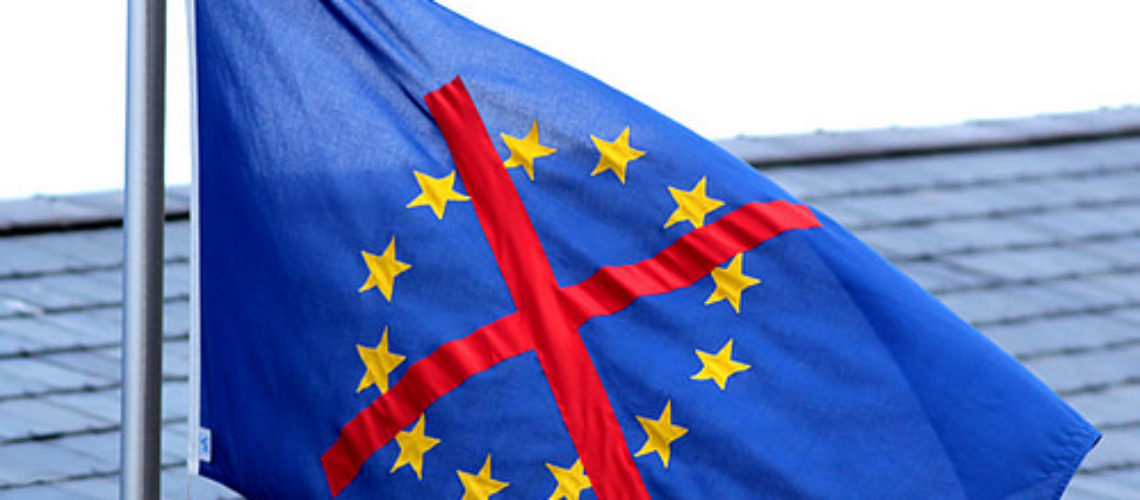MORE BIAS BY OMISSION: The respected Pew Research Centre in the US released today a survey based on more than 10,500 responses in 10 of the main EU countries.
At its heart were some very strong findings that suggest that in many vital respects, support for the EU is sharply declining. Britain is far from alone in its concerns about its EU membership.
The findings – many directly relevant to the UK referendum – included:
42% of the 10 nations want power returned to national governments, whereas only 19% want Brussels to have more power.
There has been a sharp fall in support for the EU in many countries over the past year, and longer term, summed up dramatically by this graph:
 Spelled out, support in France has fallen from 69% to 38%; in Spain from 78% to 47%; in the UK from 54% to 44%, and in Germany, there has been a decline from 58% to 50%. Even in Poland, which is benefitting hugely from EU grants, satisfaction has dropped from 83% to 72%.
Spelled out, support in France has fallen from 69% to 38%; in Spain from 78% to 47%; in the UK from 54% to 44%, and in Germany, there has been a decline from 58% to 50%. Even in Poland, which is benefitting hugely from EU grants, satisfaction has dropped from 83% to 72%.
This negativity to Brussels in the Pew research is not a one-off. Decline in support is also registered in the EU’s own research. It conducts opinion polls called the Eurobarometer series twice yearly. The latest one available is from November last year.
Key findings were:
Neutral or total negative views about the EU added up to 63%. Those who were total positive were only 37%
Those who were ‘totally optimistic’ about the future of the EU were 53%, but ‘totally pessimistic’ or did not know came in at 47%, a rise of 5% over the previous survey.
Immigration as the major issue facing the EU had risen from 38% to 58% over the previous six months. In Angela Merkel’s Germany, and many of the wealthier EU member countries the figure was above 70%.
How did the BBC reflect this?
The BBC website accurately reported that it showed that Euroscepticism is on the rise across ‘Europe’ (presumably they meant the EU because the research was conducted in solely EU countries), but then homed in on this:
‘Nonetheless (it) found that a slim majority – a media of 51% – of respondents still favoured the EU’.
The Corporation thus chose to emphasise one of the few favourable about the EU in the research, and quoted the precise figures showing that a majority were in favour. of the EU. What it did not say was what Pew had highlighted as a key feature of the favourability ratings:
‘…the EU is again experiencing a sharp dip in public support in a number of its largest member states.’
And it saved until much lower down in the report that key negative facts, such as that re support in France had crashed from 69% to 38%.
Elsewhere on the BBC, the Pew research was barely reported: Today carried brief items in the 7am and 8am bulletins. They mentioned the France figure, that support for the EU had fallen, but the voice report at 8am again stressed that satisfaction was ‘slightly higher’.
There were no interviews about the research on Today, and it did not feature in any later news programmes.
Thus the Corporation has thus explored only very cursorily an extensive study which shows that as the UK EU referendum saga reaches its final stages, support for the EU has fallen to historically low levels. Put in another way, as the UK ponders exit from the EU, support for Brussels is 6% less in France and only 6% more in Germany itself, which the BBC – for example, Mark Mardell, here – regularly projects as being the most enthusiastic of EU members.
There are numerous other angles in the Pew report that could have made features or the peg for interviews, for example, that Euroscepticism – so often portrayed on the BBC as ‘right-wing’ and ‘populist’ – is actually supported more by the ‘left’ in Spain (and other countries).
There is no knowing for certain, but it is hard to believe that if Pew had shown a rise in support for the EU, rather than a sharp decline, it would not have made the Corporation headlines – and would have led to presenters grilling figures such as Nigel Farage about why his campaign for ‘out’ was failing.
Photo by EU Exposed 

